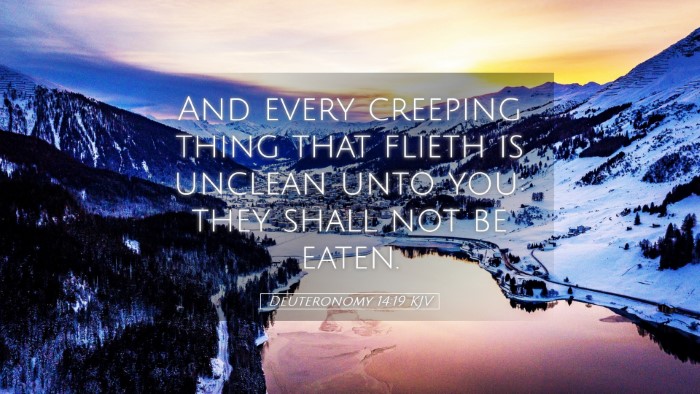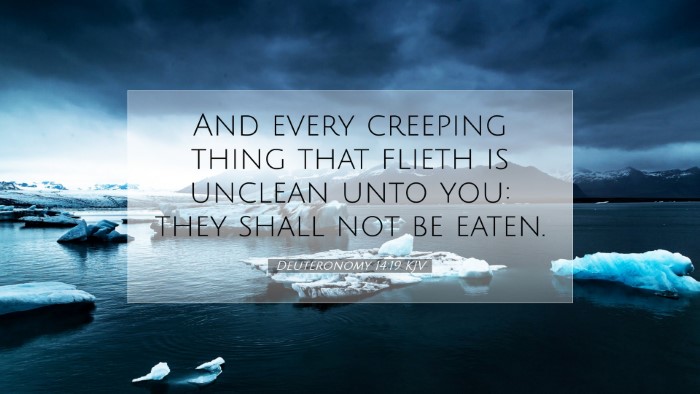Commentary on Deuteronomy 14:19
Introduction
Deuteronomy 14:19 states, “And every creeping thing that flyeth is unclean unto you: they shall not be eaten.” This verse serves as a part of the Mosaic law, focusing on dietary restrictions significant for Israelite identity and holiness. It underlines the importance of separation from the unclean and the preservation of spiritual purity among God's people.
Exposition and Analysis
To comprehend the intention behind the prohibition mentioned in Deuteronomy 14:19, we extract insights from the esteemed commentaries of Matthew Henry, Albert Barnes, and Adam Clarke.
Matthew Henry's Commentary
Matthew Henry emphasizes the symbolic nature of these dietary laws. He asserts that the clarity and categorization set forth in the Levitical laws serve not only to define what is acceptable for consumption but also to underscore the broader spiritual truth that God’s people are called to a distinct lifestyle. The “creeping things” refer to various classes of unclean animals, symbolizing the spiritual contaminants that can invade the religious life of believers if not adequately guarded against.
Henry notes, “The laws concerning clean and unclean beasts are the rules for the conduct of our lives, ensuring that we remain spiritually clean.” By abstaining from such creatures, it encourages an awareness of spiritual purity and adherence to God’s commandments.
Albert Barnes' Commentary
Albert Barnes provides a detailed examination of the implications of these dietary restrictions. He points out that the cleanliness laws were not scientifically motivated but were divinely instituted. Barnes elaborates that the prohibition of eating creeping things signifies a spiritual illustration against the moral decay that can ensue from mingling with impurities.
Furthermore, Barnes sees this instruction as a means to instill discipline among the Israelites, teaching them to value obedience over personal preference. The distinction between clean and unclean served allegorically to signify the broader doctrine of holiness that is required of God’s people. The faithful were called to reflect God’s holiness in every aspect of their lives, including their food choices.
Adam Clarke's Commentary
Adam Clarke offers a comprehensive historical and theological insight into the passage. He argues that the command not to eat unclean creatures corresponds with a broader theme of separation and holiness in Israel’s covenant relationship with God. Clarke notes that this verse aligns with the ongoing theme in Deuteronomy that God's people must maintain a lifestyle that reflects their devotion to Him.
Clarke emphasizes the importance of understanding the cultural context during the time of Moses. Dietary laws were critical for the Israelites as they were a nation emerging from slavery into a structured society that required clear boundaries and definitions of purity.
He also highlights that while the Old Testament dietary laws were specific to the Israelites, they echo New Testament principles of holiness and the calling for believers to live set apart in the world, illustrating that the essence of God's command remains unchanged through the ages.
Theological Implications
This verse not only presents a historical command but also carries theological implications crucial for contemporary followers of Christ. The call to holiness remains a fundamental aspect of the Christian faith, as God's people are to reflect His character in a world filled with moral ambiguity.
Purity and Holiness
The dietary laws, including the prohibition against unclean creatures, serve to remind believers of their need for spiritual purity. Just as the Israelites were instructed to avoid certain foods, modern believers are called to avoid behaviors and influences that could lead them away from God’s will.
Separation from the World
In examining Deuteronomy 14:19 through the lenses of Matthew Henry, Albert Barnes, and Adam Clarke, we understand that God’s directives are not merely arbitrary rules but are designed for the spiritual and communal health of His people. The emphasis on what is clean versus unclean serves as a vivid metaphor for the moral and spiritual separation from the idolatries and corruptions present in the surrounding cultures.
Covenantal Relationship
The laws of clean and unclean exemplify the covenantal relationship between God and Israel. Adhering to these commands was a reaffirmation of their commitment to live in accordance with God’s standards, reflecting their identity as His chosen people.
Conclusion
In conclusion, Deuteronomy 14:19 stands as a significant verse that informs not only the historical and cultural context of the Israelites but also provides timeless principles regarding holiness and separation intrinsic to the faith. The insights derived from the commentaries of Matthew Henry, Albert Barnes, and Adam Clarke enrich our understanding, prompting us to consider how our choices reflect our commitment to God in contemporary society.


